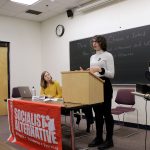Around 50 concerned Boston residents filed into a crowded room in Roxbury Tuesday night to learn how the Massachusetts Bay Transportation Authority gentrifies communities by reducing equity of access to public transportation, housing and education.
The T Riders’ Union hosted the public forum to inform residents of how at-risk communities in the city are affected by the privatization of public transportation. TRU is a part of the all-inclusive community organization Alternatives for Community and Environment, which works to create sustainable communities for people of color those with low incomes.
Transit dependent communities, or neighborhoods that are predominantly home to people of color and low-income families, rely on public transportation to get residents to and from work, school and home. These communities are the focus of the organization’s efforts, which, TRU’s Transit Justice Organizer Kim Barzola said are to “elevate the voices of residents and riders” and mobilize a unified voice for transit reform.
At the beginning of the meeting, Barzola said that the MBTA is a feeding tube into a multifaceted gentrification practice of vulnerable communities, such as Roxbury, where the event took place.
“Many people came to our meeting tonight seeking an easy answer to stop gentrification, but it’s not that simple,” Barzola said. “Gentrification doesn’t just affect individuals and families, but businesses as well … the best way to combat it is the community.”
The crowd who attended the forum consisted of passionate T riders. Louise Baxter, a veteran attendee of these public forums, said she is a dedicated advocate for access to equity. Baxter grew up in New Hampshire but has lived in South Boston since 1971 and credits the MBTA for giving her the opportunity to be mobile.
“Public transit is the reason I could work and go to school and advance myself,” Baxter said.
As a longtime Boston resident, Baxter said she has recognized a counterintuitive change to the transit system — the public institution has been falling into private hands.
The Open for Business initiative, which launched in 2015 under Gov. Charlie Baker, intended to give opportunities to different private and non-profit sectors to create economic opportunity, new housing and revenue for the Commonwealth. This initiative has motivated the buying and selling of vacant land and repurposing it into buildings, corporate chains and residential housing.
ACE’s community organizer, Michael Prentice-Glasgow, said during the meeting that this initiative is “good for the City, but bad for us.”
A lack of equal access is nothing new to Boston’s at-risk communities, but recent additions to the public agenda shine a critical spotlight on the MBTA, Prentice-Glasgow said.
The MBTA has a budget of $2 billion, collecting 40 percent of their revenue from sales tax and 30 percent from fares. However, Boston is still up for its bi-annual fare increase of a maximum of seven percent in 2018. With a budget proposal looming to seek approval in June, Barzola said the upcoming months are “budget season.”
Barzola proposed a way to counteract the Open for Business Initiative by voting for the Fair Share Amendment, informally called the “millionaire’s tax.” This income-based tax will delegate funds to public education and public transportation and will be a ballot question in 2018.
“We don’t think riders should have the burden of paying for the T more than they already are,” Barzola said. “If people don’t have access to these public institutions, they’re useless to the people they intend to serve.”
As ACE’s housing commision expert, Prentice-Glasgow of Roxbury spoke on how affordable housing fits into the issue and that even though the MBTA has been addressing affordability, the way they define it raises concerns.
Prentice-Glasgow said “affordable” is essentially defined as anything that can be subsidized, which falls under the area median income of $98,500 for a Boston household of four. However, in Roxbury, a household of four makes less than an average of $55,000 a year.
“The problem is that we can’t afford the affordable housing,” Prentice-Glasgow said during the . “That’s the double bind.”
Roxbury houses 60 percent of vacant land owned by the City, and has been a specific target of privatization, Baxter said.
“Broadway Station used to be a bunch of rooming houses and now it’s all luxury condos and rentals,” Baxter said. “As far as gentrification goes, I’ve seen South Boston ruined.”
Severe service cuts have affected Roxbury and Baxter is not the only one who has noticed. Routes into at-risk communities come less frequently, especially late at night. In most areas, transportation stops running at midnight, which could potentially leave a lot people without a way to get home, Prentice-Glasglow said.
Sol Rheem, a masters candidate who teaches ninth-graders in Dorchester, said after the meeting she was worried about the lack of equal access when she saw how it affected her students.
“Most of my students take the bus or the Red Line to school in Dorchester, so their lives, their way of getting to school is the MBTA,” Rheem said. “The better the service, the more reliable the service, the more my students come to school and attendance hugely impacts they way they perform at school.”
Emanuel Powell, a second-year graduate student at the Harvard Law School, said he came to learn more about how the privatization of the MBTA connects to his work with Reclaiming Roxbury, a community effort to fight displacement and gentrification.
“I came today to learn about what’s happening under the MBTA and how it’s negatively impacting displacement in Roxbury,” Powell said in an interview. “The work that ACE is doing directly dovetails with the work Reclaiming Roxbury is a part of.”
Prentice-Glasgow said ACE is stepping in to connect Boston’s neighborhoods in a way that they feel the T is not. He said he wants to make sure the City is forced to adhere to residents’ demands and said his ultimate goal is to create a city-wide governance resistance program that will create more protections for at-risk communities.
“We strive to create a united front,” Glasgow said. “This is our crusade against the City.”
CORRECTION: A previous version of this article stated Louise Baxter has lived in South Boston since 1963, not 1971. An updated version reflects this correction.




Correction I’ve lived in S. Boston since 1971 not 1963 I came to Boston in 1963 At that time lived in rooming house around Mission Hill, Back Bay and then apartments around Fenway until displaced